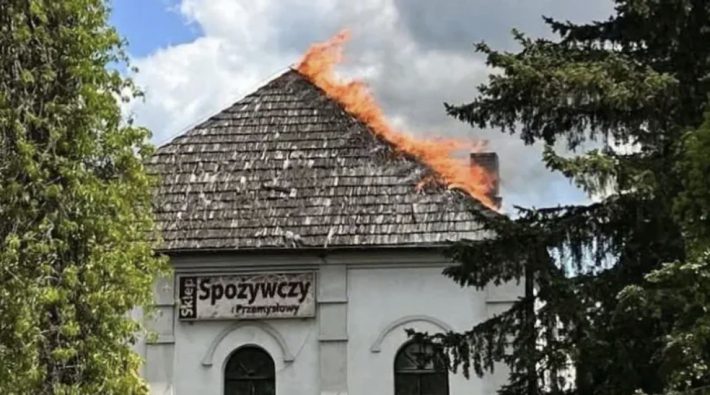Rare 19th-century synagogue in Inowłódź, Poland, which survived the Holocaust and preserved Jewish architectural elements and inscriptions, and now operates as a supermarket, sustained major fire damage.
A rare historic synagogue structure that survived World War II was severely damaged in a fire that broke out this week in the town of Inowłódź, Poland. The building, which currently serves as a local supermarket, lost most of its roof area in the fire that was dealt with by local firefighting forces.
The religious structure, which was apparently built in the late 19th century, is one of the few that survived the Holocaust and the Nazi occupation but lost its original purpose after the Jewish community of Inowłódź was extinguished. Over the years, the building has been used for a variety of commercial purposes, including an electronics store and a fertilizer warehouse, until it was converted into a supermarket.
Despite the commercial use, the building has preserved unique architectural features and Jewish symbols. Experts in the preservation of historic sites point out that remnants of prayers and original decorations from the early 20th century can still be seen on the walls of the supermarket, including inscriptions in Hebrew and Russian that include prayers for the well-being of Tsar Nicholas II – a testament to the period that preceded World War I.
“This is a rare architectural remnant that combines elements from crucial historical periods,” says Dr. Janusz Nowakowski, a conservation expert of historical buildings from the University of Warsaw. “The remaining decorations on the walls reflect the complex relationship between the Jewish community and the authorities in Eastern Europe during the period before the Russian Revolution.”
Historical research indicates that the synagogue served the Hasidic community of Ostrowiec, and before the Holocaust, it was led by Rabbi Yechzekel Halstuck Levy, who was also the rabbi of the city. Halstuck, the second rebbe of the Hasidic movement, perished along with his family in the Holocaust on the 10th of Tevet.
Meir Bulka, head of the J-Nerations organization that specializes in preserving Jewish heritage in Eastern Europe, criticized the maintenance level of the structure: “Despite the fact that the structure is listed in the Polish national monument register, it has not been maintained at standards suitable for a historical building, which likely contributed to the spread of the fire.”
According to initial estimates by conservation experts sent to the site by the Polish National Heritage Institute, significant damage was done to the structure, but it can still be restored. Local authorities have yet to announce whether they intend to restore the building as a historical site or return it to commercial use. “This is part of the shared heritage of the Jewish people and the Polish people,” emphasized Bulka. “We call on the authorities to ensure that the last remnants of Jewish life that remain in Poland are given proper protection and preservation.”





